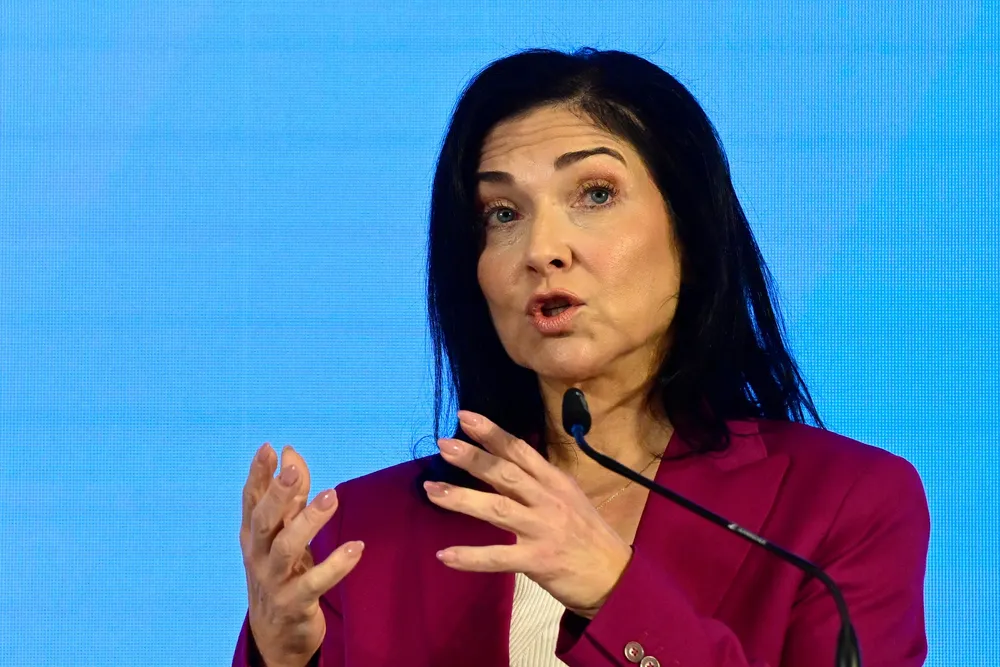Germany's new energy minister: power veteran with a tough act to follow
Katharina Reiche, a conservative from Chancellor Friedrich Merz's CDU, has big shoes to fill after predecessor Habeck’s stellar performance in pro-renewables policies

Katharina Reiche, incoming Chancellor Friedrich Merz’s pick for economics and energy minister in Europe’s largest renewable energy market, has big shoes to fill.
When her Green Party predecessor Robert Habeck handed over his ministry to Reiche on Wednesday, Germany’s renewables expansion was at full speed. In his three and a half years of office, Habeck triggered a solar boom with 17.5GW in additions last year. He also turned a wind power permitting and installation lull into an approval record of over 14GW last year that bodes well for an installation fireworks in the coming years.
Reiche’s ministry will also be somewhat less powerful than Habeck’s, as climate policies are being shifted back to the environment ministry, as in earlier governments, which could also lead to overlapping jurisdictions, as energy and climate policies often are difficult to separate.
Reiche’s CV, however, works in her favour. She has five years of hands-on experience in the power sector after acting as chair of Westenergie, a regional energy utility in North Rhine-Westphalia state and unit of E.ON, with several million power, gas and water clients.
Before that, Reiche for five years had been managing director of the association of municipal utilities (VKU), which represents 1,500 local and regional utilities that jointly form a key pillar of Germany’s Energiewende (energy transition).
At the helm of the VKU, Reiche in 2019 had lobbied for an acceleration of the country’s then sluggish wind power expansion. The energy ministry, ironically, at the time was also led by a CDU member, Peter Altmaier. Reiche then called for a much speedier permitting and reserving 2% of the country’s area for wind power projects, demands that Habeck later enshrined in legislation.
But the CDU politician in the past has also lobbied for the continuation of nuclear power in Germany and an energy mix including coal, in order to keep power prices low.
Lowering power prices has in fact been a more recent demand of both Reiche’s conservatives from the CDU/CSU and its Social Democratic (SPD) coalition partner.
To lower energy costs, the Energiewende needs to be overhauled to get away from a too narrow focus on marginal energy costs or the levelized cost of energy (LCOE) of renewables, towards a view on the overall system costs of energy, Reiche argued in a recent post on LinkedIn. This would take into account grids as well as the costs for storage, backup power plants and redispatch measures.
It is still somewhat unclear what priorities the new government will set in energy policy, but Reiche in her article points to a recent study by the McKinsey consultancy that proposes to reduce the outgoing government’s 2035 targets for solar power to 186GW from 309GW, for onshore wind to 126GW from 157GW.
A massive fleet of 80GW in hydrogen-ready gas-fired power plants would back up the renewable power, according to the study, while carbon capture and storage (CCS) would help to reduce remissions.
“There are other measures that would help improve the current situation. It is important to examine them, without ideological reservations, to determine whether they are capable of achieving climate neutrality by 2045 while simultaneously reducing the necessary costs,” Reiche wrote.
“This is the only way they should be measured and evaluated.”
‘Without ideological reservations’ in conservative speak usually means including fossil and nuclear technology, which both could lead to a reduction in renewables ambitions.
It isn’t immediately clear what position Reiche has on offshore wind.
“To achieve this, we need a smart regulatory framework and an investment-friendly environment to simultaneously drive the industrial transformation towards climate neutrality.
“For the value chain in Germany to benefit from the ramp-up of offshore wind energy, the industry needs short- and medium-term planning and thus investment security. We are open to new approaches that consistently focus on the efficient expansion and cost-effective operation of offshore wind farms.”
Reiche is no newcomer to the Berlin political scene.
She was a member of the Bundestag (lower house of parliament) between 1998 and 2015, and acted as state secretary in the ministry for environment, nature conservation and nuclear safety from 2009 to 2013.
Tender for gas-fired plants
That would include tendering off 20GW of gas-fired power plants as renewables alone would not be able to supply an industrialised nation like Germany at affordable prices.
"The tender process for this must begin quickly. We also want to improve domestic gas production conditions. CCS and CCU will also play a greater role."
As expected, she also announced a better "synchronisation of the expansion of renewables with grid expansion, both spatially and temporally" and a repeal of the heating act, but didn't mention renewables targets.
Reiche also said that Germany's excessively high electricity prices must go down.
"We want to stabilise and reduce them. To this end, the coalition agreement stipulates, among other things, the introduction of an industrial electricity price, the reform of the grid fee system, and the use of reserve power plants beyond the sole purpose of avoiding supply bottlenecks."
(Copyright)